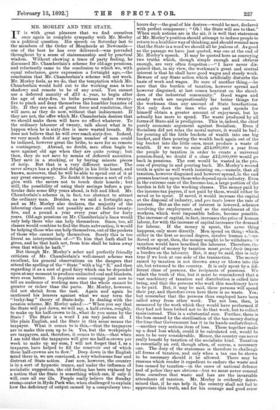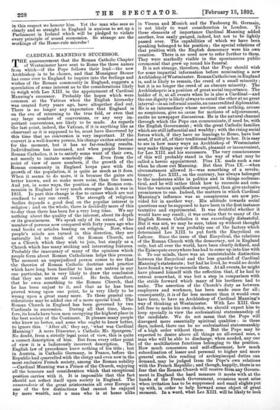MR. MORLEY AND THE STATE.
iT is with great pleasure that we find ourselves once again in complete sympathy with Mr. Morley on a political question. His speech on Saturday last to the members of the Order of Shepherds at Newcastle— one of the best he has ever delivered—was pervaded throughout by a sense of statesmanship and by practical wisdom. Without showing a trace of party feeling, he discussed Mr. Chamberlain's scheme for old-age pensions, and reluctantly came to the conclusion to which we, with equal reluctance, gave expression a fortnight ago,—the conclusion that Mr. Chamberlain's scheme will not work. Mr. Morley feels, as we do, that the temptation which Mr. Chamberlain would hold out to the working man is too shadowy and remote to be of any avail. You cannot use a deferred annuity of £13 a . year, to begin after the age of sixty-five, to bribe persons under twenty- five to pinch and deny themselves the humbler luxuries of life. If they are men of great force and resolution, they will save, as they do now, without that inducement. If they are not., the offer which Mr. Chamberlain desires that we should make them will have no effect whatever. To the ordinary labourer of twenty, talk about what is to happen when he is sixty-five is mere wasted breath. He does not believe that he will ever reach sixty-five. Indeed, we very much doubt if any large number of men could be induced, however great the bribe, to save for so remote a contingency. Abroad, no doubt, men often begin to save against old age when they are quite young; but then, they do not save by means of deferred annuities. They save in a stocking, or by buying minute pieces of scrip. But that is a very different matter. The saver always has a physical delight in his little hoard, and knows, moreover, that he will be able to spend out of it at any great emergency. No doubt it becomes a sort of reli- gion with the savers not to touch their hoards ; but still, the possibility of using their savings before a par- ticular date some fifty years ahead, is felt and liked. Mr. Chamberlain's scheme is, in fact, too abstract to attract the ordinary man. Besides, as we said a fortnight ago, and as Mr. Morley also declares, the majority of the labouring class could not possibly save .t5 before twenty- five, • and a pound a year every year after for forty years. Old-age pensions on Mr. Chamberlain's lines would only help these who can help themselves. Since, too, all classes would combine to find. the State subvention, it would be helping those who can help themselves, out of the pockets of those who cannot help themselves. Surely this is too literal an interpretation of—" To him that hath shall be given, and he that hath not, from him shall be taken away even that which he hath."
But though Mr. Morley's sober and perfectly friendly criticism of Mr. Chamberlain's well-meant scheme was excellent, his general observations on the dangers that attend the spelling of the " State " with a big " 5," and then regarding it as a sort of good fairy which can be depended upon at any moment to produce unlimited coal and blankets, were even better. It requires some courage just now to tell an audience of working men that the whole cannot be greater or richer than the parts. Mr. Morley, however, did not shrink from the task. Again and again he cautioned his hearers against what we may term the " lucky-bag " theory of State-help. In dealing with the pension scheme, Mr. Morley asked :—" When you say that the State will put down, we will say, a half-crown, roughly, to make up his half-crown to 5s., what do you mean by the State ? The State is a word I am very jealous of. I like plain English, and the State in this sense means the taxpayer. What it comes to is this,—that the taxpayers are to make this sum up to 55. Yes, but the workpeople are taxpayers, and, therefore, it comes to this,—that when I am told that the taxpayers will give me half-a-crown per week to make up my sum, I will not forget that I, as a taxpayer, have helped to fill the reservoir out of which these half-crowns are to flow." Deep down in the English mind there is, we are convinced, a very wholesome fear and distrust of State action. Just now, however, the country is in a sort of hypnotic trance, and under the influence of socialistic suggestion, the old feeling has been replaced by a notion that the State is something which can, if only it will, cure all our ills. People really believe the Sunday stump-orator in Hyde Park who, when challenged to explain how the deficiency of output caused by a compulsory two- hours day—the goal of his desires—would be met, declared with perfect composure : " Oh ! the State will see to that." When such notions are in the air, it is well that statesmen of Mr. Morley's position should attempt to induce people to return to a healthier way of thinking, and should remind men that the State is a word we should all be jealous of. As good as the passage we have just quoted, was one at the end of Mr. Morley's speech. It may be quoted here as conveying two truths which, though simple enough and obvious enough, are very often forgotten :—" I have never dis- guised that, in my view, the workman's great and central interest is that he shall have good wages and steady work. Beware of any State action which artificially disturbs the basis of work and wages. Be sure of another thing,—be sure that the burden of taxation, however spread and however disguised, at last comes heaviest on the shoul- ders of the industrial community." Good wages and steady work are unquestionably far better things for the workman than any amount of State benefactions. Not only does the man who gets and spends for himself obtain a greater amount of enjoyment, but he actually has more to spend. The waste produced by all forms of State-aid is prodigious. This is, indeed, the chief purely economic argument against Socialism. Even if Socialism did not relax the moral nature, it would be bad ; for pouring all the little buckets of wealth into one big bucket, and then pouring the wealth back again out of the big bucket into the little ones, must produce a waste of wealth. If we were to raise £14,000,000 a year from the people by taxation in order to create a universal pension-fund, we doubt if a clear £12,000,000 would go back in pensions. The rest would be wasted in the pro. cess of pouring in and pouring back. Mr. Morley's second truth is quite as well worth insisting on,—namely, that all taxation, however disguised and however spread, in the end presses heaviest upon those who depend upon industry. Even in the extreme case of the Income-tax, a large portion of the burden is felt by the working classes. The money paid by the income-tax payers, if not paid by them, would either be saved or be spent. If saved, it would increase the capital at the disposal of industry, and pro tanto lower the rate of interest. But as the rate of interest is lowered, schemes involving the employment, and so the enrichment of the workers, which were impossible before, become possible. The increase of capital, in fact, increases the price of human labour, for with the increase of capital increases the demand • for labour. If the money is spent, the same thing happens, only more directly. Men spend on things which, either in the first or second degree, involve human labour. Saved or spent, then, the money sought to be withdrawn taxation would have benefited the labourer. Therefore, the withdrawal of money by taxation must prima, facie impose a burden on the labourer. But, it may be said, this is only true if we look at one side of the transaction. The money raised by taxation is not thrown away or blown into the air, but returned to the country. It is only spent by a dif- ferent class of persons, the recipients of pensions. We admit the truth of this, but it must be remembered that a vast machinery of taxation and distribution is called into being, and that the persons who work this machinery have to be paid. But, it may be said, these persons will spend their pay, and therefore even here there is no waste. Yes; but remember that the persons thus employed have been called away from other work. The net loss, then, is measured by the work which they would have performed if they had not been bribed not to do that work, but to collect taxes instead. This is a substantial sum. Further, there is the loss caused by the sterilisation of the tax-money during the time that Government has it in its hands undistributed, —another very serious item of loss. These together make up a dead loss which, could it be calculated out, would be seen to be very considerable. Hence, the country can never really benefit by taxation of the socialistic kind. Taxation is essentially an evil, though often, of course, a necessary one. The duty of the statesman is therefore to challenge all forms of taxation, and only when a tax can be shown to be necessary should it be allowed. There may be reasons which render it expedient to endure the waste and loss caused by taxation—in the eases of national defence and of police they are obvious—but we must never conceal from ourselves that waste and loss are the invariable attendants of taxation. Mr. Morley is evidently deter- mined that, if he can help it, the country shall not fail to appreciate this truth, and for his courage and good sense in this respect we honour him. Yet the man who sees so clearly and so straight in England is anxious to set up a Parliament in Ireland which will be pledged to violate every principle of sound economics. So strange are the workings of the Home-rule microbe !



































 Previous page
Previous page